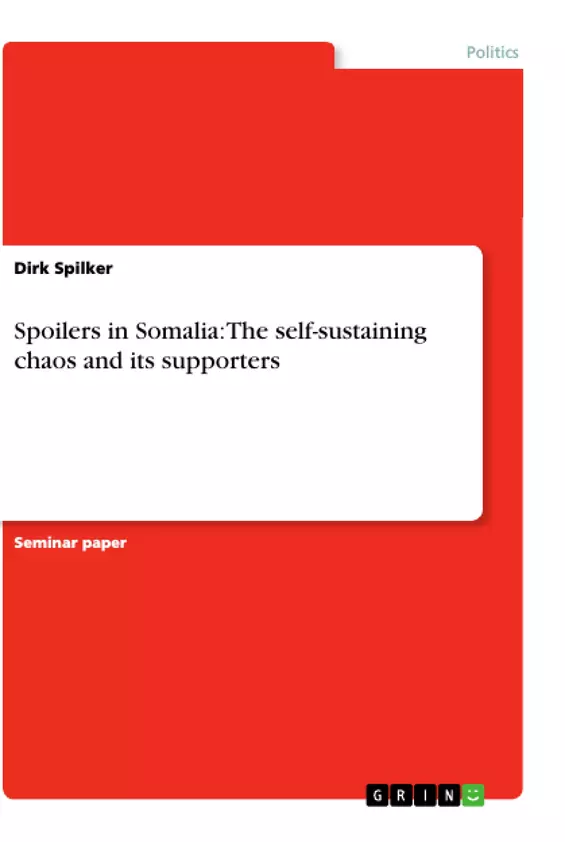This paper provides an explanation for the continuous failure of peace processes in Somalia over the last decade, using based on an extended rational choice / public choice approach. Based on the concept of “Spoilers” and their main motives as outlined by Schneckener (2003), it provides a mapping of the main actors in stateless Somalia and analyses their respective motives. As a result, this paper argues that the behavior of the main actors in Somalia is completely rational. The two main motives out of which the actors involved have spoiled peace processes in the past reflect the basic dichotomy that has been discussed in recent literature concerning intra-state wars. The most important reason for spoiling peace processes in Somalia is greed, which applies mostly to local warlords and businessmen as well as to international companies. To a lesser degree also neighboring countries are affected by greed. The second important motive is grievance; which affects mostly neighboring countries as external actors, and - to a lesser degree - “separatist” actors from the northern autonomous regions of Somalia. Two other motives – “creed” and “autism of violence” are not as important, but also play a distinct role for some actors, in the first case foremost for members of local militias, in the latter case for the “separatist” regions. Based on the detailed analysis, this paper provides a summary mapping of the relevant actors according to their predominant motives. It concludes with some strategies on how to deal with the different Spoilers in the Somali context.
Inhaltsverzeichnis (Table of Contents)
- ABSTRACT
- BACKGROUND: ON THE CONCEPT OF "SPOILERS"
- HISTORY AND RECENT DEVELOPMENTS IN SOMALIA.
- GENERAL SITUATION.
- THE "OLD" TRANSITIONAL NATIONAL GOVERNMENT ("TNG"; 2000-2003/4).
- THE „NEW" TRANSITIONAL FEDERAL GOVERNMENT (FROM OCTOBER 2004)
- SPOILERS IN SOMALIA: SUSTAINING THE CHAOS AS RATIONAL CHOICE
- GREED: THE WAR ECONOMY IN SOMALIA
- GRIEVANCE: WHY NEIGHBORS WANT TO SUSTAIN THE STATUS QUO.
- AUTISM OF VIOLENCE: VIOLENCE AS A WAY OF LIFE.
- CREED
- THE SOMALI SPOILERS AND THEIR MOTIVES: SUMMARY
- NO WAY OUT? DEALING WITH SPOILERS
Zielsetzung und Themenschwerpunkte (Objectives and Key Themes)
This paper aims to explain the persistent failure of peace processes in Somalia over the past decade using an extended rational choice / public choice approach. It focuses on the concept of "Spoilers" and their motivations, providing an analysis of the main actors in stateless Somalia and their respective motives. The paper argues that the behavior of these actors is rational and driven by two main motives: greed and grievance.
- Rational choice and public choice theory in explaining conflict dynamics.
- The role of "Spoilers" in sabotaging peace processes.
- Motivations of key actors in Somalia, including greed, grievance, creed, and autism of violence.
- The impact of the war economy on the conflict.
- Strategies for dealing with Spoilers in the Somali context.
Zusammenfassung der Kapitel (Chapter Summaries)
The paper begins by introducing the concept of "Spoilers" and their motivations, drawing upon the work of Schneckener (2003). It then provides a historical overview of recent developments in Somalia, highlighting the country's division into three entities: Somaliland, Puntland, and Southern Somalia. Chapter 3 focuses on the general situation in Somalia, including the lack of a central authority, the ongoing inter-clan war, and the absence of a functioning state structure.
Schlüsselwörter (Keywords)
The paper explores the concept of "Spoilers," rational choice theory, public choice theory, peace processes, Somalia, statelessness, conflict dynamics, war economy, greed, grievance, creed, autism of violence, and the motivations of key actors in the Somali conflict. It utilizes the framework of rational choice theory to analyze the behavior of these actors and their impact on the ongoing conflict.
Frequently Asked Questions
What is the concept of "Spoilers" in peace processes?
Spoilers are actors who believe that peace emerging from negotiations threatens their power, worldview, or interests, and therefore use violence or sabotage to undermine peace processes.
Why does the author argue that the chaos in Somalia is "rational"?
Based on rational choice theory, the author suggests that actors in Somalia benefit from the state of chaos (e.g., through war economies), making their decision to spoil peace a logical choice for their own gain.
What are the main motives for spoiling peace in Somalia?
The two primary motives are greed (economic gain from war) and grievance (political or historical complaints), with creed and "autism of violence" playing secondary roles.
How does the war economy impact Somalia's stability?
The war economy allows local warlords, businessmen, and even international companies to profit from the absence of a central state, creating a strong incentive to maintain the status quo.
What is the role of neighboring countries in the Somali conflict?
Neighboring countries are often driven by grievance or strategic interests, sometimes preferring a weak or divided Somalia to ensure their own regional influence or security.
- Citar trabajo
- Dirk Spilker (Autor), 2005, Spoilers in Somalia: The self-sustaining chaos and its supporters, Múnich, GRIN Verlag, https://www.grin.com/document/46600



